This mom is suing the state of Tennessee over abortion: Her story
Legal actions have been filed in three states with near-total abortion bans — Idaho, Tennessee and Oklahoma — on behalf of eight women who say they were denied abortions despite serious health conditions.
Tennessee mom Allie Phillips is one of those women.
At 18 weeks gestation, Phillips says she was told there was hardly any amniotic fluid surrounding her fetus — a baby girl.
After additional testing, she learned her baby had several fetal complications. She says her baby's bladder, stomach and kidneys had not properly developed, her heart had only two chambers and her brain had not split into two hemispheres — a condition called semi-lobar holoprosencephaly.
The baby would not survive, she says doctors told her, and continuing the pregnancy would put her health at risk.
"The doctor said I had two options: terminate or continue the pregnancy," Phillips, 28, tells TODAY.com. "She said if I chose to terminate, that because of Tennessee's recent ban, I would have to look at another state — I wasn't able to do it here."
Tennessee has one of the strictest abortion bans in the country — banning all abortions with narrow exceptions for pregnancies that may cause severe physical impairment or death. Due to the non-medical exception language, many doctors say they have been afraid to provide abortion care, risking fines and jail time.
"My husband asked: 'How long does she have?'" Phillips says. "(The doctor) said: 'We don't know, there's no way to tell because of her condition' ... but the longer she's in my womb, the worse she's going to get and the higher the risk to my health. We had to make a decision — my life was on the line, too."
'I just wailed'
Phillips was thrilled to tell her then 5-year-old daughter she was going to be a big sister in October 2022.
"Her jaw just dropped and her eyes got all big and then she just started clapping," Phillips says. "Every night, she would lay her head on my belly and sing 'Twinkle Twinkle Little Star' and say 'good night, baby.'"
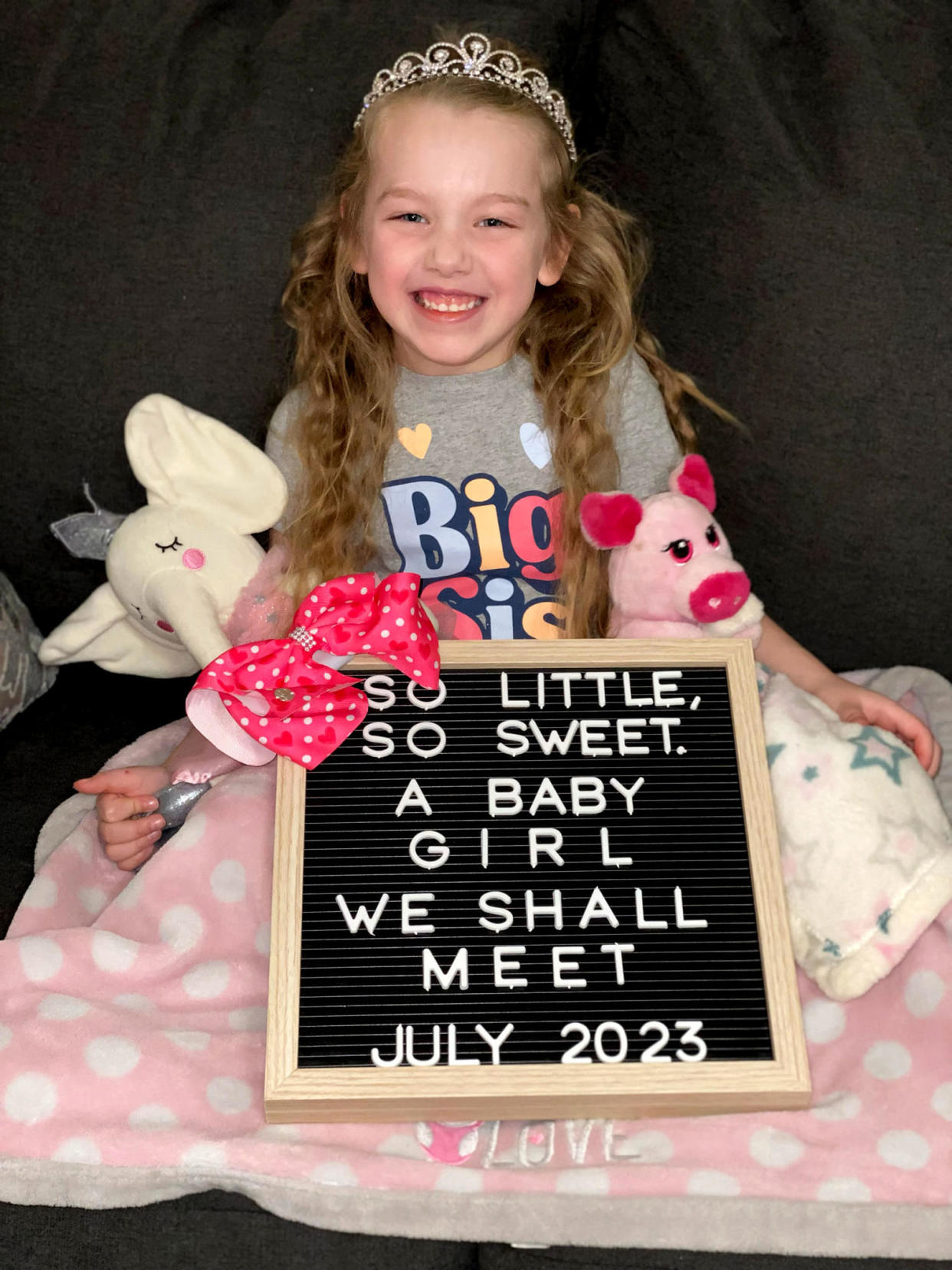
Phillips, once a single mom, had just married a previous high school boyfriend and purchased a house. The pair were actively trying to get pregnant — Phillips' husband did not have any biological children of his own.
"This would have been his first child," Phillips says.
At 15 weeks, the couple learned they were having a girl.
"I went through every article you could think of — unique baby names, popular baby names, and not-popular baby names. We even did Scottish names, British names," Phillips says.
After weeks of searching, Phillips and her husband found the perfect name: Miley Rose.
Weeks later, after she received the devastating diagnosis, Phillips says she desperately hoped there was some way to continue her pregnancy and give birth to a healthy baby girl.
Phillips says she was told because there was hardly any amniotic fluid surrounding Miley, she would surely suffocate in utero, in addition to the serious issues with her kidneys, bladder, stomach, lungs and heart.
"At this point I had knot in my throat, my hands are getting sweaty and I was getting nervous, but I was simultaneously thinking: 'OK, well, you can get bladder transplants. You can get kidney transplants. You can get a heart transplant," Phillips recalls. "She'll be OK — we can fix these things. Then she went up to her brain and her skull."
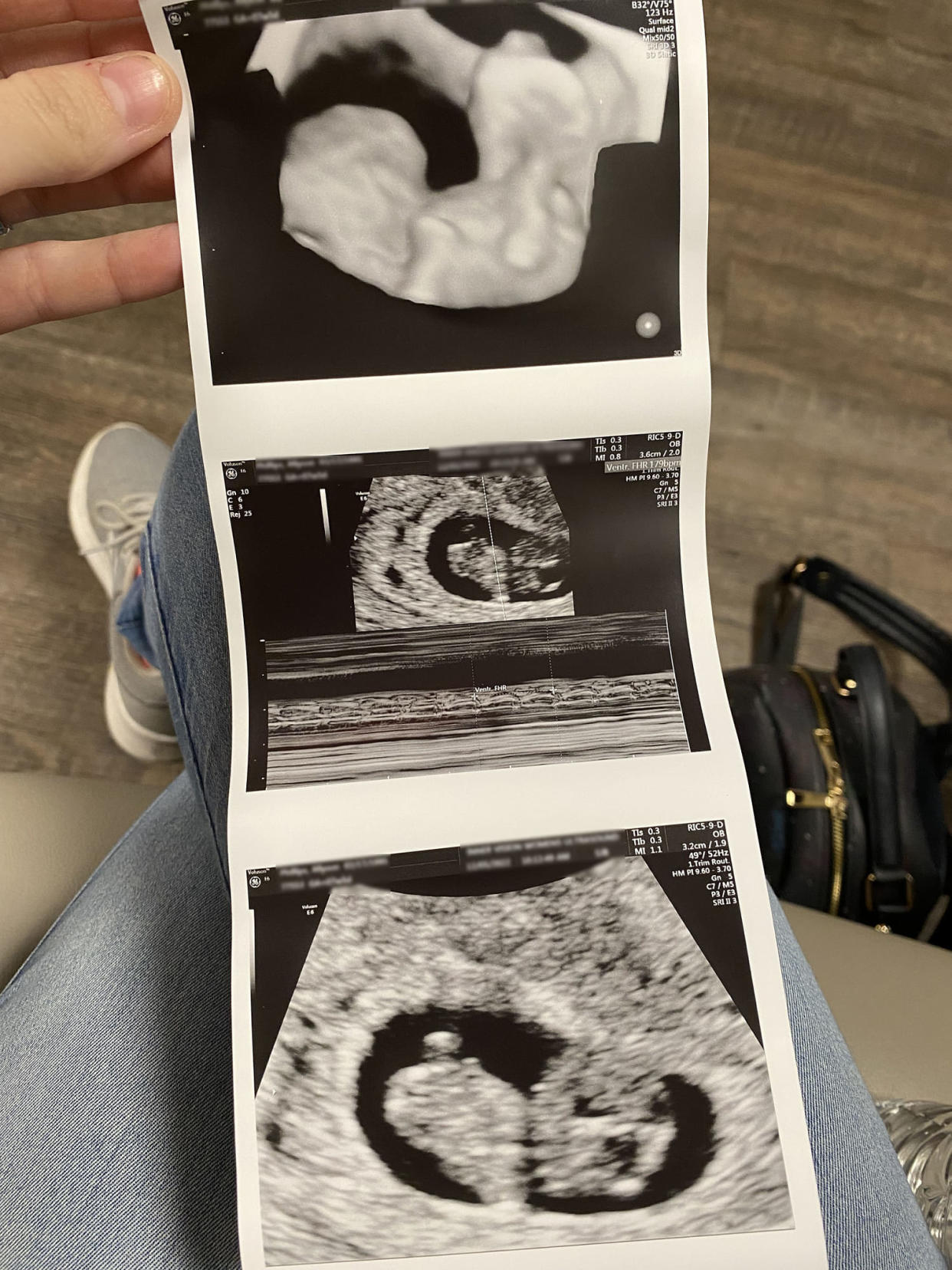
The doctor explained that because Miley's brain did not separate into two hemispheres, she had a 3% chance of surviving the pregnancy. Coupled with her other fetal defects, that already slim chance plummeted — there was zero chance Miley would survive, the doctor said, and if she died in utero without anyone knowing, Phillips was at risk for severe infection, blood clots and even death.
"I just went numb," Phillips says. "(The doctor) stepped out of the room for about five minutes — it took me a minute to come back, then I just wailed."
After a silent drive home, Phillips and her husband ultimately decided on termination.
"It is really hard to explain to a 5-year-old that a baby's not going to live," Phillips says, crying. "The best way I explained it to her was that Miley was very, very sick, and if she stayed in my belly she was going to make mommy very sick, too. So in order for mommy to stay, we had to let Miley go.
"She cried and said: 'I want my sister,'" Philips continues through tears. "I said: 'I know honey, we want her too."
'She wanted you to know that you were making the right decision'
Phillips and her husband, Bryan, had to find an out-of-state clinic that would provide abortion care.
"We called (clinics in) four or five different states, mainly in the North and Northeast," Phillips explains.
Phillips was nearing 20 weeks of pregnancy. One clinic in Chicago told her an abortion procedure at 20 weeks would be $1,500.
"I said: 'OK, well I can't get there this week," she adds. "'What about next week?' The woman said: 'Then it's $2,500.' I was like: 'Oh my god, I don't have $2,500 lying around.'"
Phillips kept looking and found a clinic in New York City that would charge her $1,500.
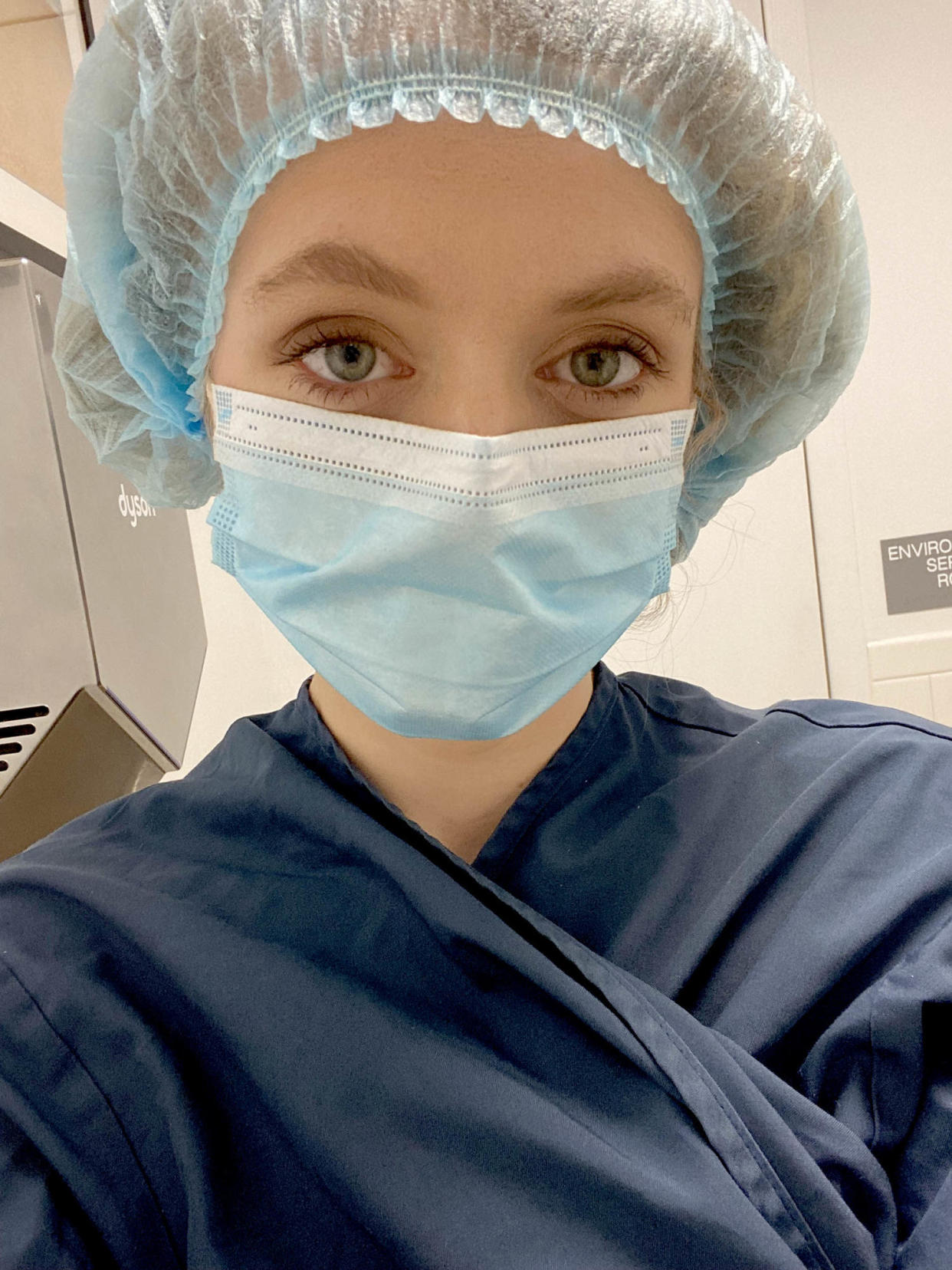
Her husband Bryan took a week off work, and Phillips — who runs an in-home daycare — told parents the daycare would be temporarily closed.
Two round-trip tickets from Nashville to New York City cost $500 each. The abortion was a two-day procedure, and the three-day hotel stay cost $1,200.
"It was getting very expensive very quickly," Phillips recalled. "We are the average American family that lives paycheck to paycheck —we did not have that money set aside for a random trip to New York City in a week."
Desperate, Phillips and her husband set up a GoFundMe to help pay for the cost of travel, lodging, food and the procedure itself.
Donations started pouring in — many from total strangers.
"It just kind of gave me faith in humanity and made me feel very supported and loved," Phillips says.
In an exam room at the clinic in New York City, Phillips had another ultrasound. The ultrasound technician told Phillips she could not find a fetal heartbeat.
Miley had died in utero.
"I just started crying, the technician started crying and then she hugged me," Phillips says. She called her husband, who was not allowed in the room with her, then she called her mom.
"She said: 'I know this hurts. I know this sucks. But I think Miley gave you the best gift she could have possibly given you,'" Phillips recalls. "'She wanted you to know that you were making the right decision, so she left on her own time.'"
Unable to know exactly when Miley had passed, doctors told Phillips she was now at severe risk for infection and blood clots — they would have to perform her abortion procedure within the hour.
"My whole body was shaking when they brought me back to get the anesthesia," Phillips says. "When I woke up I asked if it was successful. The nurse said: 'Yes ma'am.' I said: 'So, I'm not pregnant anymore?' She said: 'No ma'am, you're not.'"
'This is her purpose'
Phillips says being forced to leave her home state to get an abortion while mourning the loss of her daughter was "exhausting."
"I really don't think I took the time to grieve at the beginning," she says. "It wasn't until it was all said and done that I could breathe — it hit me and I went to a really dark place."
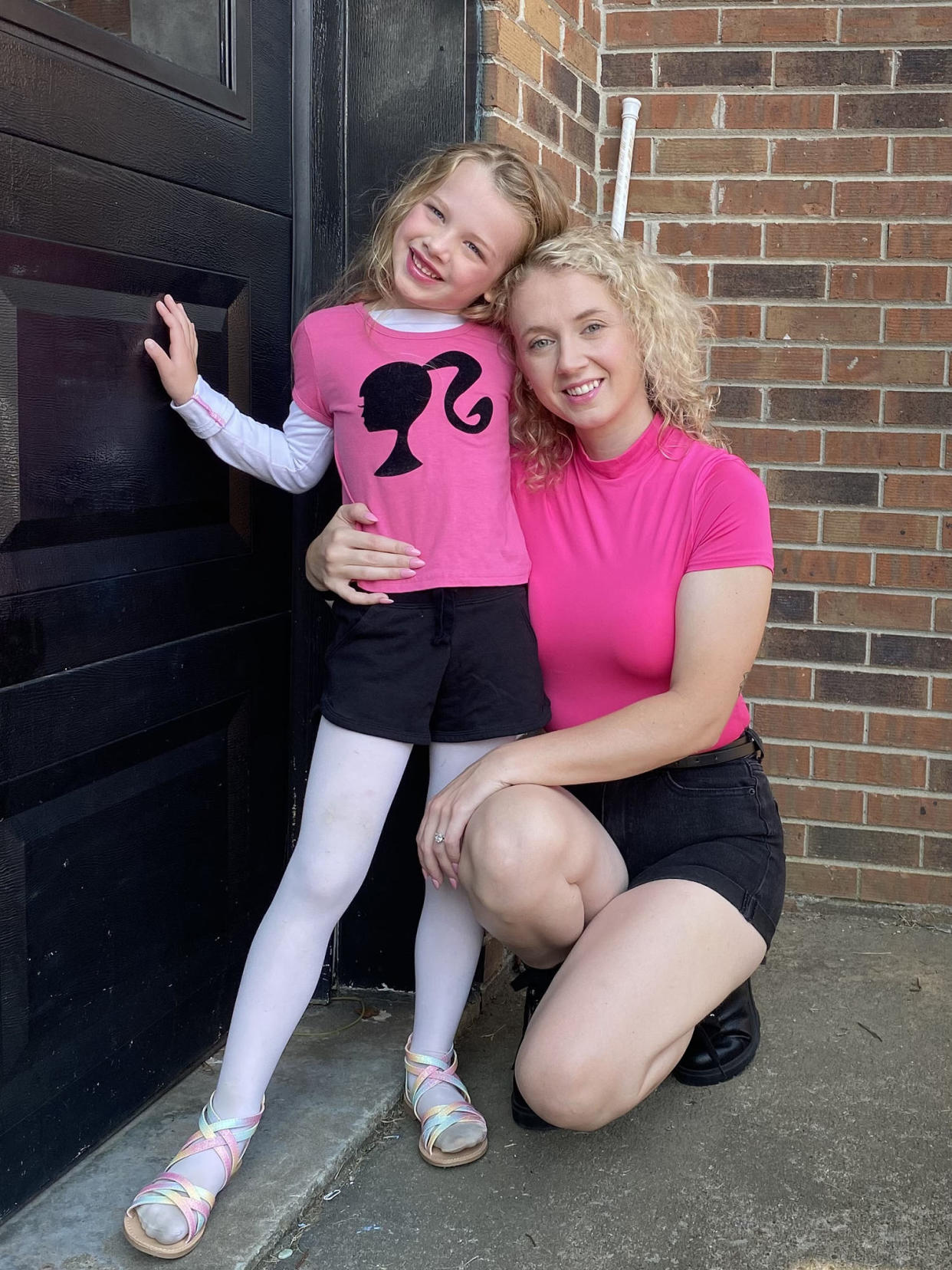
Phillips heard about a lawsuit filed against the state of Texas on behalf of 13 women who, like her, were denied abortion care.
"Watching those women testify, I cried at a lot of their stories," she says. "They made me relive mine."
Shortly after, Phillips decided to join a similar lawsuit against Tennessee, as one of the plaintiffs challenging the exception language in the state's abortion ban.
"The Center for Reproductive Rights filed a complaint in state court arguing that pregnant people in Tennessee are being deprived of their right to life via the abortion ban," Linda Goldstein, a senior council for the legal advocacy organization, said in a press call on Tuesday, Sept. 13. "Their lives and their health were threatened by continuing their pregnancies, so we are arguing that the state constitution bars that kind of treatment of pregnant people.”
The lawsuit asks the court for an injunction to stop the state of Tennessee from enforcing its abortion restrictions.
"If the court agrees that it is unconstitutional to encroach upon pregnant patients’ right to life," Goldstein tells TODAY.com in an exclusive statement, "the remedy will be to enjoin Tennessee officials from enforcing the ban in those circumstances."
TODAY.com reached out to Tennessee Attorney General Jonathan Skremtti and Melanie Blake, President of the Tennessee Board of Medical Examiners — both named as defendants in the lawsuit — for comment. The Medical Examiners' office did not respond.
Amy Lannom Wilhite, Director of Communications for the Office of Tennessee Attorney General, said, “We have not been served with the complaint and will review the case when we receive it.”
The next step in the lawsuit will be the state's legal response to the filing.
Phillips joined the Tennessee lawsuit with two other women and two Tennessee OB-GYNs.
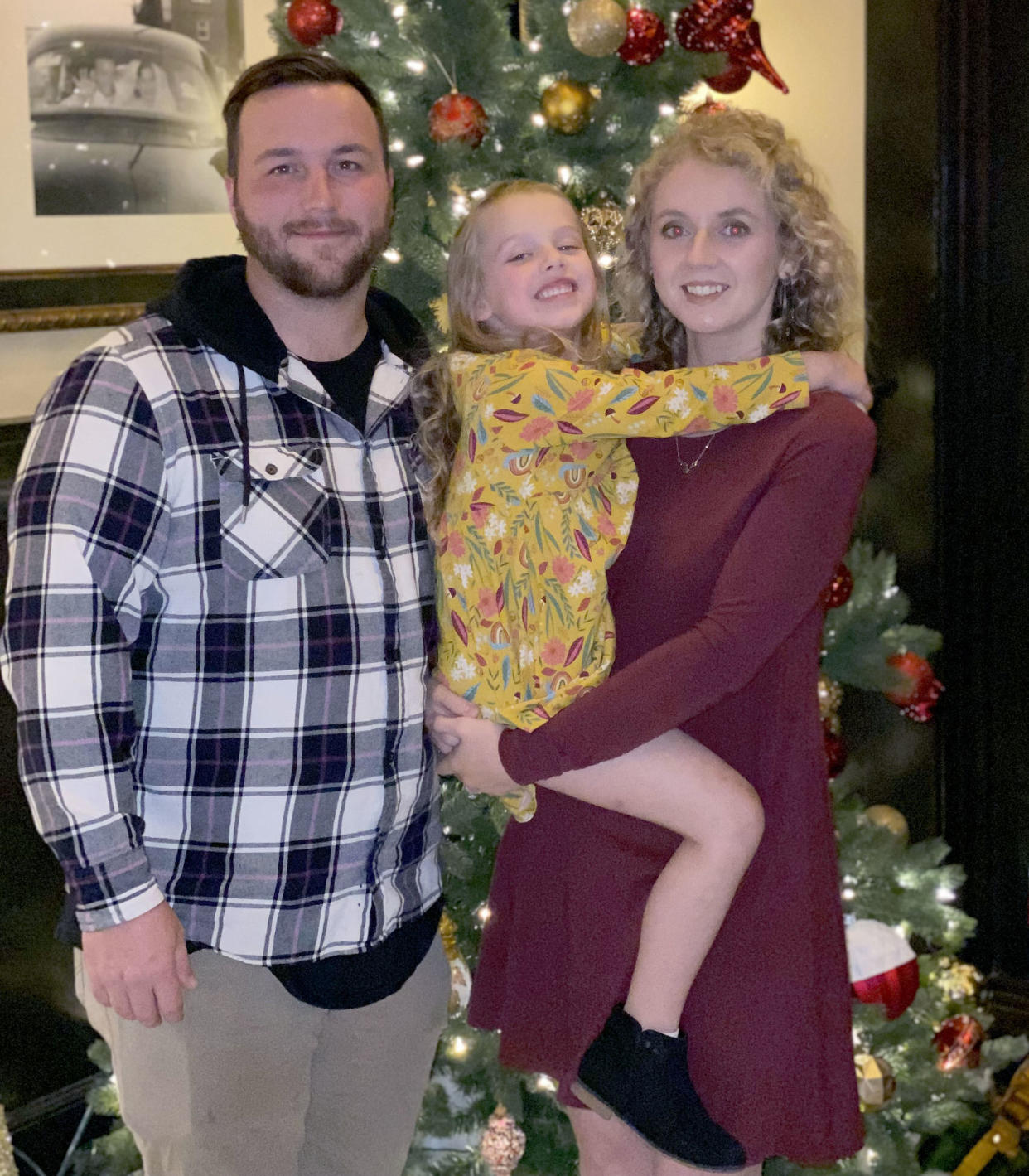
Phillips says she was nervous prior to the lawsuit being filed.
"It makes me scared," Phillips says. "I know that I'm prepared for it, but ... I'm waiting for the next wave of people to tell me I murdered my daughter. I also feel empowered as a woman and a mom. I'm showing Adalie that you can fight for change.
"If anything, I feel like this is a pivotal moment in my life," she adds. "It took me time, but I finally accepted that Miley was never supposed to be Earth-side. This is her purpose, I'm just the voice behind it."
On Monday, Oct. 2, 2023, Phillips announced she is running for office in the state of Tennessee.
"Because of the trauma Tennessee’s ban has caused me, I have been dedicating my time to try to to change their barbaric laws,” Phillips said in a video posted to her campaign website. “I plan to fight for my community and every single person in this state.”
This article was originally published on TODAY.com
